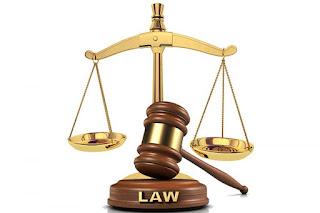functions of law
1.
Explain the purpose and functions of Law.
The law serves many purposes and functions in
society. Four principal purposes and functions are establishing standards,
maintaining order, resolving disputes, and protecting liberties and rights. The
law is a guidepost for minimally acceptable behavior in society.
The law serves many purposes and
functions in society. Four principal purposes and functions are establishing
standards, maintaining order, resolving disputes, and protecting liberties and
rights.
1
Establishing Standards
The law is a guidepost for minimally
acceptable behavior in society. Some activities, for instance, are crimes
because society (through a legislative body) has determined that it will not
tolerate certain behaviors that injure or damage persons or their property. For
example, under a typical state law, it is a crime to cause physical injury to
another person without justification—doing so generally constitutes the crime
of assault.
2
Maintaining Order
This is an offshoot of establishing
standards. Some semblance of order is necessary in a civil society and is
therefore reflected in the law. The law—when enforced—provides order consistent
with society’s guidelines.
3
Resolving Disputes
Disputes are unavoidable in a society
made of persons with different needs, wants, values, and views. The law
provides a formal means for resolving disputes—the court system. There is a
federal court system and each state has its own separate court system. There
are also various less formal means for resolving disputes—collectively called
alternative dispute resolution (ADR). We will learn about the federal and state
court systems in chapters 6 and 7, respectively, and about ADR in chapter 9.
4
Protecting Liberties and Rights
The constitutions and statutes of the
United States and its constituent states (see chapter 5) provide for various
liberties and rights. A purpose and function of the law is to protect these
various liberties and rights from violations or unreasonable intrusions by
persons, organizations, or government. For example, subject to certain
exceptions, the First Amendment to the Constitution prohibits the government
from making a law that prohibits the freedom of speech. Someone who believes
that his free speech rights have been prohibited by the government may pursue a
remedy by bringing a case in the courts.


Comments
Post a Comment